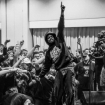"If you're not fighting for a cause, you're not participating in life. Simple as that," says Madball vocalist Freddy Cricien. "Speak up, fight, educate yourself, make a difference and make sacrifices for what's important to you."
Cricien knows of what he speaks. For the past three decades he's been fronting New York City's hardest, and hardest-working hardcore band, Madball: from their 1989 debut 7-inch, Ball of Destruction — recorded when Cricien was just 12 and the group was little more than an Agnostic Front side-project (Roget Miret, AF's main man and Cricien's half-brother, would often invite the young musician onstage to sing with the legendary hardcore crew) — to their latest and ninth full length, For the Cause (Nuclear Blast), a signature collection of lionhearted, groove-laden, street-level NYHC.
Along with drummer Mike Justian and bassist Hoya Roc, For the Cause sees the return of original Madball guitarist Matt Henderson, who hasn't appeared on a Madball album in well over a decade. Production duties were captained by Rancid's Tim Armstrong; a first-time collab between the NorCal punk and the band. In addition, the record boasts a surprisingly diverse array of guests throughout its duration: The Business' Steve Whale joins Armstrong on the catchy as fuck "The Fog," Psycho Realm's Sick Jacken guests on the anthemic as fuck "Rev Up" and legendary emcee Ice-T throws down on the hardcore as fuck "Evil Ways."
That unparalleled Madball energy is there, as are the vicious breakdowns. Lyrically, Cricien is as poignant as ever, touching upon subject matter that is as relevant and relatable as it is unsettling: from living a genuine life, perseverance, the hypocrisy of authority and the evils of mankind to love and respect for lost friends and loved ones. However, For the Cause is most certainly not your older sibling's Madball. From start to finish, it presents various twists and turns stylistically as well as thematically; all the while maintaining that trademark thickness and low-end rumble.
One constant which has remained a component of the Madball experience throughout its lifespan has been an authentic portrayal of urban life. This band has always sounded like New York City, and lyrically, For the Cause reflects that in spades. Some younger generation hardcore kids liken it to hip-hop — a comparison which often brings with it a lot of criticism.
Today's crop of hardcore enthusiasts often fails to comprehend that building this relatively young scene hasn't always been as easy as it may seem to them (thanks Internet). Like with its cultural cousin hip-hop, street culture is a genuine aspect of New York Hardcore, and has been since its earliest days on the Lower East Side. It's an attitude, sure, but more importantly, it is a tool which the pioneers of this movement have been forced to employ in order to survive the countless outside forces constantly threatening to destroy it. The truth remains — as with anything related to NYC, including its hardcore bands — the grit, grind and sometimes violent aspects of the Big Apple are, and will always be, there. Madball exemplifies this like no other group of its generation.
We discussed this phenomenon, and much more, with Cricien in order to gain a greater understanding of the group's unique hardcore recipe, the keys to its extraordinary longevity, as well as its noble cause.
YOU GUYS TOOK SOME CHANCES MUSICALLY AND VOCALLY ON FOR THE CAUSE. BEING THAT HARDCORE KIDS TEND TO BE KIND OF FICKLE, DO YOU EVER WORRY ABOUT HOW THEY'LL REACT TO CHANGE?
FREDDY CRICIEN We do think about that, but we also feel obligated to ourselves and everyone else to evolve, at least somewhat. We took more "chances" on this record than any previous one and can live with it because it's still very much us. It's real and honest. There's plenty on there to satisfy the people that have supported us from every era of the band. How do you grow as a band or a person if you don't take chances?
HOW DID TIM ARMSTRONG COME TO PRODUCE THIS NEW ALBUM?
Tim's an old friend, and we always talked about working together in some capacity. He respects our band and how long we've been around doing what we do. His style of production is perfect for how we work. He knew we had a vision for how this record should sound, so he let us do our thing, but was there every step supporting us and cheering us on. Whenever he did chime in, it was well thought out and he made good suggestions.
On one song, "For You," he even helped write the hook. For the most part though, he was there in a very supportive and non-meddlesome role, which for this particular album, was the best-case scenario. It's a tricky thing, producing: You can truly enhance something, or you could also ruin a record if the band lets you. Since we've always been so hands-on with that, this team worked great.
HOW DID YOU ENLIST ICE-T TO WORK ON THE SONG "EVIL WAYS?" IS HE AN INFLUENCE OF YOURS?
Having been a part of hip-hop culture from early on, Ice-T, along with a handful of other key figures and groups, have influenced me for sure. It might be more subconscious or subtle when I'm writing for Madball, but the influence is there in some way. I think when people make an impression on you, be they musicians, artists, poets, relatives, friends; it manifests itself somehow, some way, even if it's in a small way. The important thing is to take whatever influences you, and mold it into your own thing.
Ice-T supports and respects our band and the scene we come from, and the whole connection with him came about in a very organic way. Unfortunately, we didn't get to do this track together in the studio. The logistics of everyone's schedule didn't allow for that, but we spoke on the phone, emailed and connected that way. He really added a good flavor and drove home the point of the song in a way only Ice-T can! It was a real honor to work with someone I've been following and have respected since I was a kid.
HOW WERE YOU FIRST INTRODUCED TO HIP-HOP?
I was the youngest of four, so in my household there was always an eclectic mix of music: Latin music, salsa, etc. That's what my folks listened to. Plus, there was classic rock, pop, of course hardcore and hip-hop. I remember seeing the Sugar Hill Gang record cover, Kurtis Blow The Breaks, Grandmaster Flash and the Furious Five, Melle Mel … My first purchase was Doug E. Fresh and Slick Rick The Show, which had La Di Da Di as a B-side. After that, I just got a hold of whatever I could: Public Enemy, Beastie Boys, LL Cool J, Eric B. and Rakim, Boogie Down Productions, Big Daddy Kane, Kool G Rap … From the west, Ice-T and NWA … Oh man, it goes on and on, and that was just the eighties.
The Nineties was a whole other animal. When Yo! MTV Raps arrived, that was my shit! It was the best thing that ever happened to MTV or TV in my opinion. I just loved and really connected with the culture: the music, the graffiti, breakdancing, all of that.
DO YOU THINK MADBALL'S APPROACH AND ATTITUDE IS SIMILAR TO THAT OF SOME UNDERGROUND HIP-HOP ARTISTS?
I think so. The whole DIY approach is where I think we're most alike. All underground movements sort of share that. The special connection between underground hip-hop and hardcore is the relationships amongst some of the artists. Some of us are hardcore kids who are also hip-hop heads. Coincidentally, some of the hip-hop guys used to be, or still are hardcore kids, or are into heavy music, so there's even more of a connection, in addition to the struggle of making a living via underground music. Plus, the street element, that's a given.
YOU GUYS HAVE ALWAYS BEEN KNOWN FOR HAVING THE MOST AUTHENTIC "STREETWISE" APPROACH AND ATTITUDE IN HARDCORE. WHERE DOES THAT COME FROM?
The streets! [Laughs] I think our upbringing and the fact that we spent a lot of years running around the streets of NYC, for better or worse, gave us a certain education — one you can't really get in a lot of other places. I think "street smarts" is part instinct and part learned. We had both. It doesn't make us cooler or tougher, it's just what it was.
People ran with the whole "tough guy" label because we talked about real shit. If speaking from a real place is considered being "tough," we're guilty as charged. I never liked that label. We're just a hardcore band with some real-life experience under our belts. I think we appeal to more than just "street kids." What we're talking about is applicable to a lot of different scenarios, and relatable to a multitude of people from all walks.
SOME NEWER HARDCORE KIDS SEEM THREATENED BY AND SEEM TO DISLIKE THE "STREET" ELEMENT IN HARDCORE. THEY TEND TO BLAME HIP-HOP. WHAT DO YOU SAY TO THOSE KIDS?
You can't blame hip-hop or anything else for the fact that you're … How can I put it? SOFT! This thing is called "hardcore" for a reason. It's supposed to be abrasive, rough around the edges, rebellious, pissed-off and in your face. Hard, regardless of what the band is about. For the "tougher" bands, the content is not always necessarily about the streets, and these days, it's typically not even though it might be perceived that way. That said, dismissing an element that has influenced this subculture greatly; an ingredient that's so vital, especially for the NYC faction — one of the more influential factions — that's just ridiculous and insulting.
There are many facets to this and all of it should be respected, whether it's street, or sociopolitical or religious - whatever your thing is. It's all necessary. It's all important. It's about freedom of expression, not playing it safe. Sorry! To add to that, what should be "monitored" is authenticity. Now, that's a fair argument. Regardless of what the band is rooted in, are they real? Are they true to what they're saying? Can they back it up? That's what kids need to buy into and appreciate. Authenticity, sincerity and passion.
DO YOU THINK SOME OF THESE KIDS HAVE BECOME TOO CAUGHT UP IN SO-CALLED "GANGSTER RAP" AND TAKE IT TOO SERIOUSLY? IN OTHER WORDS, ARE THEY TOO FOCUSED ON THE IMAGE WITHOUT UNDERSTANDING THE CULTURE OF IT.
Yes, I think so. The older generations respected the consequences that come with "gangsterism" in all its manifestations. Some new kids think it's trendy until reality slaps the shit out of them! Then they rat — which is also something which is becoming too commonplace. Such is the case with a lot of things these days. The respect factor is declining. I know I sound like "that old dude," but honestly, I'm not speaking from a bitter or jaded place.
I'm active and doing my thing, living my life. I've survived a lot of crazy shit and I appreciate that. I'm still surviving and trying to keep my fam fed. I'm good right now and it's only looking up. I have no competition with, or ill will toward any of these misguided youth. I'm just speaking on how I see it. I'm with the youth. I'm rooting for them, but there's a disconnect from reality. Blame it on the internet and a million other things I guess. Or maybe parents need to just step their game up!
HAS HARDCORE BECOME TOO SPLINTERED OF LATE AS FAR AS SUB-GENRES AND SCENES WITHIN SCENES?
To a degree, yes. That's nothing new though. To be brutally honest, that whole "youth crew" movement started that elitist shit. Yes, I said it. That was the beginning of the construction of the walls. Ironically, some of them sang of breaking down walls, and the lyrics were well intended I think, but whether they realized it or not, they were creating divisions: this one drinks and smokes, so fuck him, even though some of those same kids they were saying "fuck off" to would be coming to their shows to vent. I get that you didn't want to be a drunken or drugged up mess — more power to you. You're better off, but the approach created some partitions.
Now don't get me wrong, I like a lot of those cats. Mike Judge [Judge, Youth of Today] for example: he's really respectful and appreciates what bands are doing now to keep this alive. I'm not trying to start any shit. I'm just giving you my perspective on the history of the divisions. Now, the division is new school versus old school, or metallic versus melodic, or tough guy versus who the hell knows. I never viewed this scene that way, and I still don't. I like all of the above. Dividing a culture that's already so small in the grand scheme is silly and counterproductive. Everyone has their preferred style and a certain taste, fair enough, but to not give something a chance based on what it looks like or what you perceive it to be … Because they're too young or too old, or not hip enough on Instagram. That's corny and goes against what we as a culture and scene are supposed to be about.
I'm from the school of Agnostic Front. They would put every kind of band on their undercard at any given CBGB matinee. All variations of hardcore. Everyone filled the place and had a freaking blast beginning to end, regardless of background, dietary preference or whatever. We've always tried to do the same thing, because that's what it's about: unification not separation. Sure, we attract some rougher-around-the-edges types here and there, and why not? This scene has had rough-around-the-edges types since its inception, but we don't cater to one type. We speak our mind and hope that people can relate.
Where you're from, or how you grew up, or what you drink or eat shouldn't factor in. Religion shouldn't factor in. What the focus should be is how we relate. What do we have in common? We all like this aggressive, rebellious music, where we come to vent and let go, so do that. Don't watch who or how many people are dancing. If you feel something, get in there! Too much worrying about who thinks what.
DO YOU THINK THE YOUNGER HARDCORE GENERATION HAS BECOME TOO FOCUSED ON THE SCENE AND LESS SO ON THE BANDS AND THE MUSIC?
I think so, especially in America. Not everywhere in America, but it's prevalent here, culturally speaking. I wouldn't say that's the case in New York City though. It's all ridiculously ironic considering hardcore is an American-born genre. We set the standard and then sort of lost ourselves. Not the bands and not everyone obviously, but there was, and is, a lack of appreciation for what this "culture" and music means.
The contributions to other genres and sub-cultures made by bands and people from this world is bigger than some realize. Europe gets it on a whole other level. They embrace the sentiment behind the movement. The essence is very present there, and it's passed on to the younger generation. It's actually like that everywhere except the U.S. Hardcore is a tradition, a lifestyle, a true movement in certain places, and that's how it should be. Maybe the U.S. will make a turnaround. I have faith.
TWENTY-FIVE YEARS DOWN THE ROAD, HOW WOULD YOU DESCRIBE MADBALL'S MISSION WHEN IT COMES TO HELPING HARDCORE MAINTAIN ITS STATURE AND PROGRESS?
Our mission is to help preserve the culture, but also help move it along. Same with our band; we want to progress, but it has to be tasteful and organic. Madball is one of many vehicles. We know what flag we're carrying, and we'll plant it in as many places as we can. We don't forget where we come from and we don't forget that we need the new school as well as the old. We do this with all our heart and soul, and hopefully, that reaches all hardcore kids and beyond. Hardcore lives!












